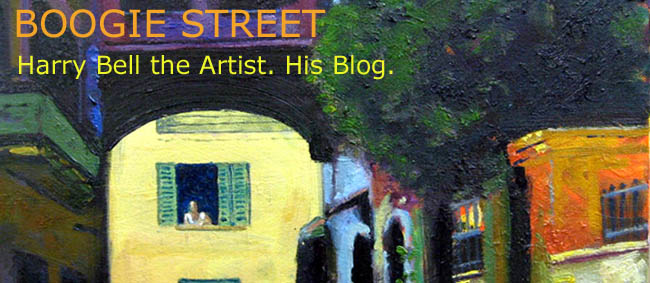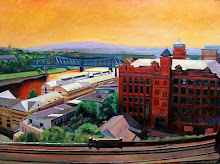I don't know why this should be, but perhaps I'm too much like Leonardo (he said, modestly):
Don’t underestimate this idea of mine, which calls to mind that it would not be too much of an effort to pause sometimes to look into these stains on walls, the ashes from the fire, the clouds, the mud, or other similar places. If these are well contemplated, you will find fantastic inventions that awaken the genius of the painter to new inventions, such as compositions of battles, animals, and men, as well as diverse composition of landscapes, and monstrous things, as devils and the like. ["Treatise on Painting"]
Give me an abstract and I will find something figurative within it. So it is, whenever I start to paint an abstract, I find the figurative elements surging forward. This isn't a great problem really, except that when I'm in a reflective mood and wondering if my work is going the right way, I look around and all I see in galleries is abstract. I recognise this is a kind of tunnel vision produced by a transitory period of low self-esteem, but it does seem at times that all the general public is interested in buying is abstracts.
My friend Mo, in a recent email said:
"... thinking about it, it could all do with what's fashionable at the moment. In all the magazines I've seen recently about interior design and so forth, they've always shown rooms festooned with abstract art - maybe one large piece of work on a wall to make a statement - and you know how everyone follows like sheep - never mind what the quality is like."
The work of hers that has proven most successful in terms of sales has also been "a bit on the abstract side of figurative as well. "
This thought thread was brought on by the comments my post Corner Gallery, Biscuit Factory. Of the pictures that I posted there, the favourite among Commenters seems to be Wooden Sunset, and to my mind, this is the most abstract looking picture in the set (although it's actually a straight representation of the side of a boat).
So what do you think? Is abstraction the most enduring element of Modernism? Are the general public buying more abstracts than figurative and if so, is it all down to what goes with the curtains?
____________________________
A brief aside, with thanks to Casey Klahn for bringing it to my attention:
I never became an abstract painter because I love to draw, I love to represent. I tried to do abstract paintings, and it always seemed to me that I was throwing out a baby with the bath water. [Wolf Kahn]












6 comments:
I have it the other way 'round. I always wonder if the public is after representational art, while the fine art world likes a little abstraction.
In the words of our immortal Wolf Kahn when asked what the art world is doing at the moment, he blurts out, "I don't give a s*!t!"
Please pardon me, but that is what he said...
No delicate sensibilities here, Casey. I'd have put the "hi" in. But thanks for an interesting change of perspective. Of course, looking at US art mags, there does seem to be an emphasis on Realism which is less evident here.
Been meaning to come back and comment. I think there's an inherent problem with abstract for abstract's sake. All my paintings start representational (and in fact I consider them to be even in the end) and I loosen and simply as I go from sketch to study to final canvas.
So wouldn't worry so much about it. Start with your subject and see how far you want to push the representational image. :)
I did 2 blogs about this some time ago, if you're interested.
http://tina-m.blogspot.com/2007/12/brief-lesson-1-start-with-specifics.html
http://tina-m.blogspot.com/2007/12/brief-lesson-2-break-it-down.html
Thanks, Tina. Interesting posts, particularly the second. I wouldn't want to give the idea that I actually worry about this, tho. I'm not unhappy with the way I paint, which is obviously what comes most naturally to me. But I'm always interested in what the public likes, even if I don't intend to pander slavishly to those likes. And developing different ways of working and looking at things is always beneficial.
I am certainly interested in the UK's current looser mood in art versus the US. I wonder what the derivation is there?
Is the gigantic US market driven by the buying public to feed their (baser) desires? Is that bad, or neutral, or good? Is the UK taking the cultural lead and their art reflects this with artistic freedom?
Tina, those are great posts!
I don't think I know the answer, Casey, but I did come across this quote recently:
"While abstract expressionism has been labeled a uniquely American form, some have re-interpreted it as the culmination of intense European influence over American artists. On the other side of the debate, realism has been called the American artform. Benjamin West, Eakins, and the Ash Can School are seen as the real fathers of American art."
Sorry, I didn't note down the author.
Post a Comment